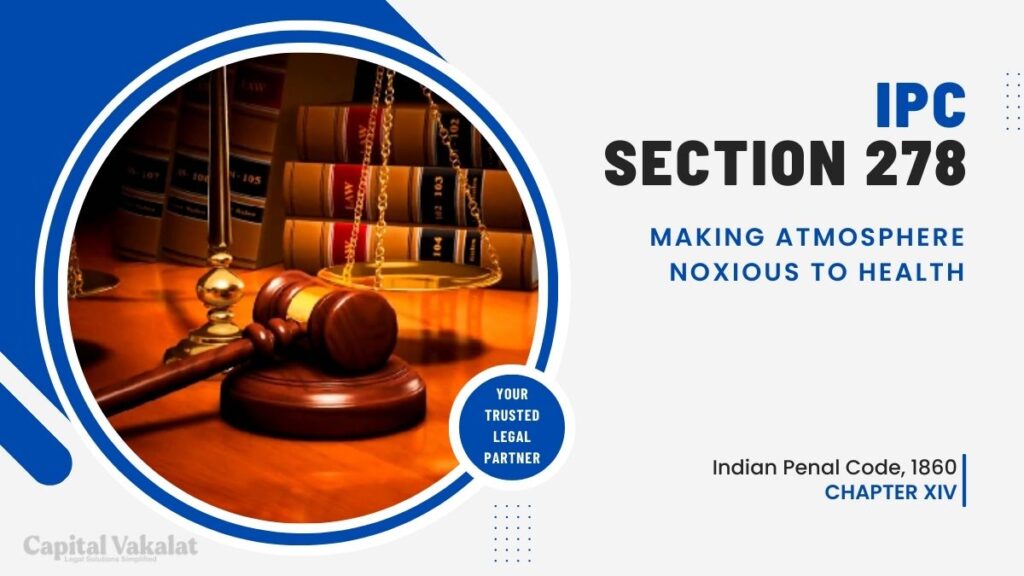Section 278 of the Indian Penal Code (IPC) plays a pivotal role in safeguarding public health by addressing activities that can make the atmosphere noxious. This section encompasses a wide range of activities that, when left unchecked, can have detrimental consequences on both the environment and human health.

Understanding Section 278 IPC
Section 278 of the IPC specifically deals with “making the atmosphere noxious to health.” It prohibits any act that knowingly endangers public health by polluting the atmosphere. This includes activities such as releasing harmful gases, pollutants, or toxic substances into the air. The intention behind this section is to maintain a healthy atmosphere that promotes the well-being of society.
Types of Activities Covered
This section covers a diverse array of activities that can make the atmosphere noxious. These activities include industrial emissions, vehicular pollution, open burning of waste, and any action that leads to the release of hazardous substances into the air. The potential health hazards stemming from such activities are extensive and can range from respiratory diseases to long-term environmental damage.
Historical Context
The need for Section 278 IPC became evident as industrialization and urbanization advanced, leading to increased environmental pollution. Recognizing the necessity of legislation to protect public health, this section was incorporated into the IPC. The historical context underscores the importance of addressing environmental concerns in a rapidly developing society.
Legal Consequences
Violating Section 278 IPC can result in significant legal consequences. Those found guilty can face imprisonment, fines, or both. The severity of the penalty depends on the nature and extent of the violation. Several cases have set legal precedents, making it clear that the Indian legal system takes this section seriously.
Environmental Impact
The activities covered by Section 278 IPC not only affect human health but also have profound environmental implications. Air pollution leads to deteriorating air quality, acid rain, and the depletion of the ozone layer. Understanding these broader environmental consequences emphasizes the significance of this section in preserving our planet.
Public Health Implications
A noxious atmosphere poses a grave threat to public health. It can result in respiratory problems, cardiovascular diseases, and even premature deaths. Government agencies and health authorities play a crucial role in monitoring and mitigating these threats to ensure the well-being of the public.
Enforcement and Challenges
Enforcing Section 278 IPC comes with its own set of challenges. Identifying and penalizing the culprits can be complex, particularly in cases of industrial pollution or large-scale violations. Non-governmental organizations (NGOs) often partner with government authorities to address these challenges and promote environmental protection.
International Comparisons
Comparing Section 278 IPC with similar laws in other countries reveals a global commitment to addressing environmental issues. Many nations have their own legal frameworks to combat air pollution and protect public health. International efforts, such as the Paris Agreement, demonstrate a shared commitment to tackling climate change and its associated threats.
Conclusion
In conclusion, Section 278 IPC is a crucial piece of legislation aimed at maintaining a healthy atmosphere and protecting public health. Its significance cannot be understated, considering the environmental and health challenges posed by activities that make the atmosphere noxious. While enforcement and challenges exist, the global community’s efforts to combat environmental pollution and climate change highlight the shared responsibility to create a healthier planet.
Frequently Asked Questions
How can individuals report violations of Section 278 IPC?
Individuals can report violations to local authorities or environmental agencies. It’s important to provide as much evidence as possible to aid in the investigation.
Are there any exemptions to Section 278 IPC for certain industries?
While there may be regulations specific to certain industries, there are no blanket exemptions from complying with Section 278 IPC. All activities that make the atmosphere noxious are subject to scrutiny.
What is the role of NGOs in enforcing Section 278 IPC?
NGOs often work alongside government authorities to monitor and address environmental violations. They play a vital role in raising awareness and advocating for stricter enforcement of environmental laws.
How can individuals contribute to reducing air pollution and maintaining a healthy atmosphere?
Individuals can contribute by reducing personal carbon footprint, supporting eco-friendly initiatives, and raising awareness about the importance of clean air and a healthy environment.